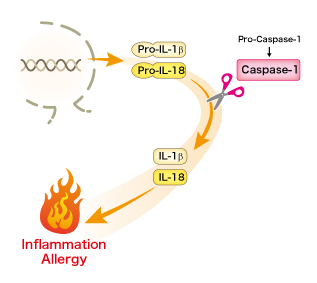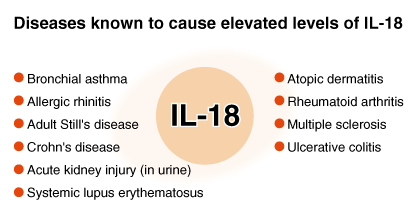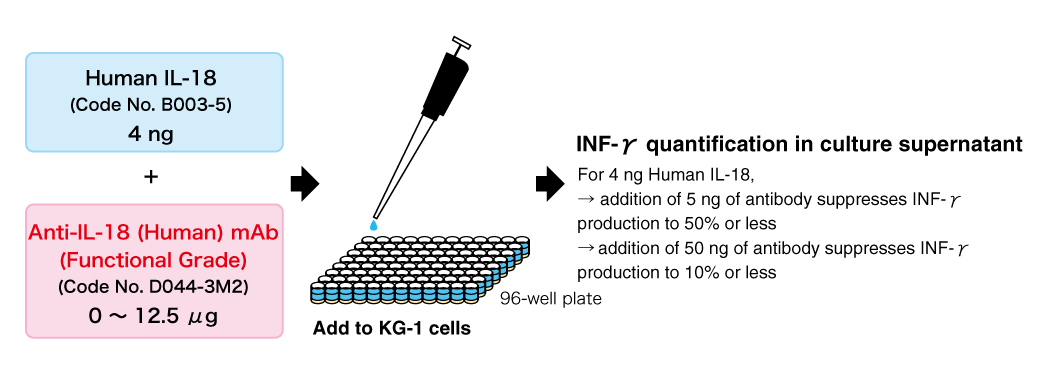- Japan(Japanese / English)
- Global
- MBL TOP
- MBL site search
IL-18
What is IL-18
 IL-18 is an 18 kDa cytokine. It was discovered as a factor that induces IFN-γ production and also shares functional similarities with IL-12. IL-18 is typically present intracellularly as a 24 kDa precursor, but it is cleaved by active caspase-1 and is secreted as a mature 18 kDa cytokine into the extracellular space.
IL-18 is an 18 kDa cytokine. It was discovered as a factor that induces IFN-γ production and also shares functional similarities with IL-12. IL-18 is typically present intracellularly as a 24 kDa precursor, but it is cleaved by active caspase-1 and is secreted as a mature 18 kDa cytokine into the extracellular space.
IL-18 in cell therapy
IL-18 is produced from Kupffer cells, activated macrophages, keratinocytes, intestinal epithelial cells, osteoblasts, adrenal cortex cells and murine diencephalon. IFN-γ is produced by activated T or NK cells and plays critical roles in the defense against microbial pathogens. IFN-γ activates macrophages, enhances NK activity and B cell maturation, proliferation and Ig secretion, induces MHC class I and II antigens, and inhibits osteoclast activation. IL-18 acts on T helper type-1 (Th1) T cells and in combination with IL-12 strongly induces them to produce IFN-γ. Pleiotropic effects of IL-18 has also been reported, such as enhanced production of IFN-γ and GM-CSF in peripheral blood mononuclear cells, production of Th1 cytokines, IL-2, GM-CSF and IFN-γ in T cells, and enhancement of Fas ligand expression by Th1 cells.
 Recombinant IL-18 protein
Recombinant IL-18 protein
Association of IL-18 with Diseases
 IL-18 is known for its association with allergies, autoimmune diseases, and other conditions. Additionally, it has been detected in urine during acute kidney injury and suggested to be involved in type 2 diabetes.
IL-18 is known for its association with allergies, autoimmune diseases, and other conditions. Additionally, it has been detected in urine during acute kidney injury and suggested to be involved in type 2 diabetes.
 IL-18 ELISA kit
IL-18 ELISA kit
Experimental Example: Neutralization Assay of IL-18 Using Anti-IL-18 (Human) mAb (Functional Grade)
When anti-human IL-18 monoclonal antibody (clone 125-2H) is pre-incubated with human IL-18, the activity of IL-18 is neutralized, and IFN-γ production in KG-1 cells (human acute myelogenous leukemia cell line) is suppressed. This Functional Grade antibody has confirmed neutralizing activity against IL-18.

 Anti-IL-18 (Human) mAb (Functional Grade)
Anti-IL-18 (Human) mAb (Functional Grade)
IL-18 related ELISA kit / antibodies / recombinant protein



